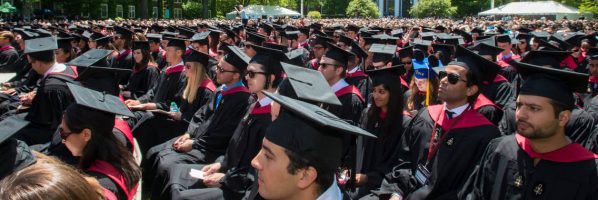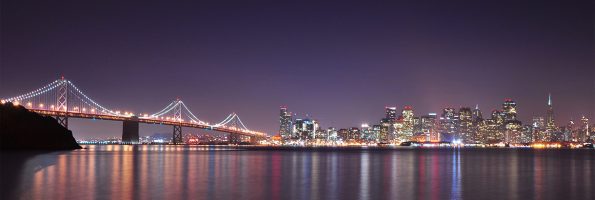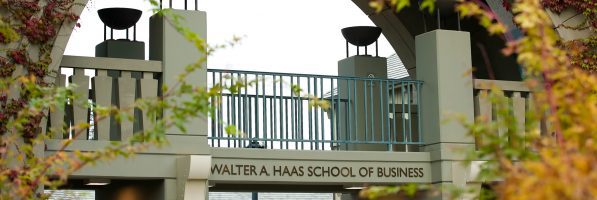Comparing The U.S. News Full-Time and Online MBA Rankings

When it comes to business school rankings, U.S. News & World Report issues one of the most comprehensive annual lists. The annual rankings includes separate lists for the “Best Business Schools” and the “Best Online MBA Programs,” but deciding which format is right for you can still be tricky. Continue reading…
The San Francisco One-Year MBA Programs You Need to Know

One-year MBA applicants already know which industry or area of concentration they want to pursue. They are MBA candidates who want to advance their current careers, rather than change them. Others chose the one-year route because it can be difficult to leave two years of work and salary. If you’re a prospective MBA in the San Francisco metro looking to make moves within your industry, we’ll show you what One-Year MBA options are out there for you.
Who Pursues One-Year MBA Programs?
According to U.S. News & World Report, accelerated MBA programs appeal to those who want to continue working in the same industry but want to move into a higher position; those who want to save time and money; and those who may want a faster return on investment for their MBA.
One-year MBAs condense what would be a semester’s worth of core business courses in a full-time program into only a few weeks. Most incoming students enter with a strong base of business knowledge. One-year programs typically do not feature a summer internship, which means that accelerated MBAs may not offer the same career opportunities that a full-time program does.
Popular One-Year MBA Programs
One-year programs have been popular in Europe for years, but have grown in popularity stateside over the past decade. Not all business schools offer a One-Year MBA, but a handful of top schools do, including:
- The Columbia Business School – Accelerated MBA Program
- The Kellogg School of Management – One-Year MBA Program
- The Johnson School (Cornell University) – Accelerated MBA
- The Goizueta Business School (Emory University) – Full-Time MBA, One-Year Experience
One-Year MBA Offerings in San Francisco
San Francisco is the cultural, commercial, financial, and educational epicenter of Northern California and Silicon Valley. Naturally, it is also home to some of the country’s premier business schools, like UC Berkeley’s Haas School of Business and Stanford University Graduate School of Business. However, those schools do not offer One-Year MBA programs.
Schools in the Bay Area that offer Accelerated MBA programs are:
- San Francisco State University College of Business
- Lucas Graduate School of Business – San Jose State University
Let’s take a closer look at these school’s One-Year MBA offerings.
San Francisco State University College of Business
San Francisco State’s full-time MBA degree is known as the Fast-Track MBA. The program features both afternoon and evening classes and can be completed in 12 months.
In order to graduate, students must fulfill a Professional Development Workshop series, eight foundation courses and ten advanced requirement courses. In the first semester of the program, students complete 15 units of core coursework, along with four workshops. After completing these requirements, students select 15 units of electives from nine possible areas of specialization, such as Accounting, Operations Research, Electronic Commerce, Finance, Information Systems, International Business, Management, Marketing, and Sustainable Business.
The program ends with a case study in Strategic Management, which evaluates strategy formulation, implementation, techniques and decision-making in the context of the economic, social, political and competitive global environment.
Tuition costs for the San Francisco State Fast-Track MBA program amount to $3,540 plus $270 per unit for part-time California residents and $5,546 plus $270 per unit for full time residents. For out of state and international students, part-time tuition is $3,540 plus $666 per unit while full-time tuition is $5,546 plus $666 per unit.
Lucas Graduate School of Business
Lucas Graduate School of Business at San Jose State offers an Early Career MBA Accelerated Track, designed for individuals who are willing to follow a very intense academic pace and wish to complete their MBA degree in 12 months. The fast-paced program is made up of 2-3 courses per session with 6-8 weeks of courses per class. The program is offered once a year starting in fall, and spans 12 months.
The Early Career MBA curriculum consists of 42 semester credit units containing 11 core courses and four electives. The core courses are often prerequisites to electives, such as Business Communications, Managing in the Global Economy, Developing and Managing People, Accounting Principles, Marketing Management, Law and Ethic, Managerial Decision Analysis, and Silicon Valley Experience.
Following core coursework, students must take a minimum of four classes (12 units) of elective coursework in the disciplines of: Accounting, Finance, Marketing, Organizational Development, Global Business Development, Entrepreneurship and Venture Development, Information Systems, and Operations Management. Students may also participate in an international semester in the summer term.
Tuition costs for the Accelerated MBA program is $25,072 for in-state residents and $41,704 for out-of-state residents.
Top MBA Programs for Producing Founders: 2017-2018 Report

Recently, PitchBook released its latest 2017-2018 Top 50 Universities Report. The ranking focused on those universities that produced the “ultimate building blocks of the venture industry: founders.”
This ranking is vastly different from rankings of top schools for entrepreneurship by U.S. News & World Report, Princeton Review, and Entrepreneur Magazine, all of which focus on factors like peer assessment surveys, curriculum, and entrepreneurial study options. Instead, PitchBook looked at a single criterion: founders of companies who received venture capital (VC) funding between January 1, 2006, and August 18, 2017, and where they went to school.
The report provides a fairly detailed breakdown of top undergraduate programs, companies (by capital raised), MBA programs, female founders, unicorns (companies that have attained the coveted $1 billion evaluation), and more. This article will focus solely on the results that relate to MBA programs, including information on female founders and unicorns.
Top MBA Programs
For the 2017-18 academic year, the top 10 MBA programs to produce founders who received VC funding were ranked as follows:
- Harvard Business School (HBS): 1,203 entrepreneurs, 1,086 companies, and $28,495 million raised
- Stanford Graduate School of Business (GSB): 802 entrepreneurs, 716 companies, and $18,259 million raised
- University of Pennsylvania’s Wharton School: 666 entrepreneurs, 585 companies, and $16,001 million raised
- INSEAD: 455 entrepreneurs, 406 companies, and $7,795 million raised
- Northwestern’s Kellogg School of Management: 445 entrepreneurs, 417 companies, and $5,680 million raised
- Columbia Business School: 441 entrepreneurs, 410 companies, and $5,465 million raised
- MIT Sloan School of Management: 437 entrepreneurs, 384 companies, and $7,797 million raised
- University of Chicago Booth School of Business: 405 entrepreneurs, 368 companies, and $5,470 million raised
- University of California – Berkeley Haas School of Business: 344 entrepreneurs, 314 companies, and $5,191 million raised
- UCLA Anderson School of Management: 247 entrepreneurs, 232 companies, and $3,957 million raised
HBS stands out immediately for producing founders who receive VC funding. Harvard produced twice as many founders as its next closest competitor, and those founders pulled in $10M more in funding for their 1,000+ companies.
As for the reason behind Harvard’s success, there are multiple elements that contribute to its production of entrepreneurs. The school is home to the Arthur Rock Center for Entrepreneurship, which offers programs for budding entrepreneurs including curricular offerings (over a dozen courses), a New Venture Competition (which offers $300,000 in cash prizes), the Rock Accelerator, the Harvard Innovation Lab, and even a Loan Reduction program that supports graduating entrepreneurs with a one-time, need-based award of $10,000 to $20,000. HBS’s extensive alumni network also provides students with connections with managing directors, partners, and founders of top VC firms including Bain Capital Ventures, Apax Partners, and Accel Partners.
Another standout for the 2017-2018 year was INSEAD. The only non-U.S. MBA program to appear in the top 10, it also moved up a spot this year over last. INSEAD grew from 393 entrepreneurs, 348 companies, and $6,131 million in capital raised to 455, 406, and $7,794 million respectively.
INSEAD’s students are supported by the INSEAD Centre for Entrepreneurship (ICE), which was founded in 2003. The center offers MBA students a chance to participate in the INSEAD Venture Competition (IVC), Entrepreneurship Bootcamps, and the Entrepreneurship Teaching Innovation (ETI) Fund, which supports the development of the “Your First Hundred Days” elective for budding entrepreneurs.
Another MBA program of note is MIT Sloan School of Management, which was fourth in capital raised on this year’s PitchBook ranking. This could indicate more successful companies coming out of MIT or a higher percentage of VC funding available to Massachusetts’ graduates.
Some of the unique entrepreneurship opportunities available from other top programs include Stanford GSB’s Startup Garage, an intensive, hands-on project course for MBA students, as well as MIT Sloan’s Martin Trust Center for MIT Entrepreneurship, which includes an accelerator, coaching, and various events. Finally, the Penn Wharton Entrepreneurship Center offers resources, events, and courses for MBAs looking to explore, develop, launch, and scale a startup.
Top Female Founders & Unicorns
PitchBook also reviewed the top MBA programs for female founders. Once again, HBS and Stanford GSB ranked first and second, respectively, with 202 and 119 female founders. Columbia Business School ranked third with 77, Wharton ranked fourth with 71, and MIT came in at fifth with 60 female founders.
As for the unicorns, the top five MBA programs are similar to the previous lists.
- HBS: 22 entrepreneurs, 17 companies
- Stanford GSB: 14 entrepreneurs, 11 companies
- Wharton: 11 entrepreneurs, 8 companies
- INSEAD: 8 entrepreneurs, 7 companies
- MIT Sloan: 6 entrepreneurs, 6 companies
This article has been edited and republished with permissions from Clear Admit.
The Berkeley-Haas MBA Career Path

Three months after graduation, nearly 87 percent of University of California, Berkeley Haas School of Business full-time MBA students had a job. These graduates accepted positions in a variety of industries and at a range of top companies including Adobe, Cisco, Facebook and Microsoft. And thanks to Haas’ close connection with Silicon Valley, 38.8 percent were in technology. Continue reading…
Admissions Tip: Considering the Campus

Continuing our series of admissions tips geared towards those individuals who are just beginning to think about their MBA applications, we wanted to offer some advice on factors to consider with respect to a school’s facilities and location. Whether speaking with current students or touring the campus for yourself, it’s helpful to approach these information-gathering experiences with as clear a sense of what matters to you as possible.
Stanford Finds Link Between Stress, Time and Money

Stanford’s Graduate School of Business recently debuted new research from professor Jeffrey Pfeffer (no relation), Haas-Berkeley professor Dana R. Carney and UCLA Anderson School of Management professor Sanford DeVoe, which demonstrates the often harsh effects of time-money awareness can have on stress levels.
